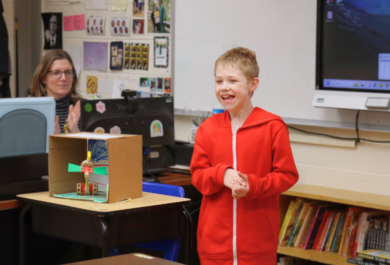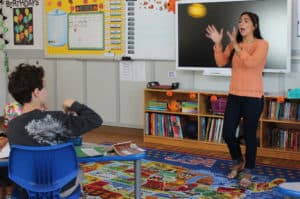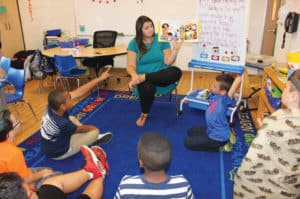Announcements

It’s hard to remember where and how we first learned to “behave appropriately.” Many of us can easily recall parents reminding us to use our manners. Teachers prompting us to raise our hand and wait for our turn in class. Even these basic skills are hard for a child to learn. Now imagine it is a child who has anxiety, or struggles with impulse control, or perhaps feels depressed or despondent. These challenges can make everyday classroom learning doubly difficult and eventually, unrewarding, when constant reprimands and punishments in response to poor behavior are part of a student’s daily experience.
In early 2017, Green Chimneys School was introduced to a behavior management framework known as Positive Behavior Intervention and Supports (PBIS). It is employed in numerous schools and youth settings across the U.S. and aimed at supporting safe and effective school, dorm and home environments while preventing problem behaviors. A unique aspect of this approach is that it focuses on reinforcement of good behaviors versus just punishing undesirable ones.
PBIS views inappropriate behavior in the same manner that problems in reading and math are viewed, as a skill deficit. When a skill deficit exists, the appropriate skill must be taught and practiced. This is not to say that there are no consequences for poor behavior; but instruction around PBIS is based in an encouraging, consistent, feedback-based approach to helping youth decide how to respond to the situations and interactions they may find themselves in.
An interdisciplinary PBIS Committee comprised of education, clinical, residential, recreation and farm staff is working diligently to lay the groundwork necessary for this research-based initiative to be successful. This has included surveys with staff, students and families about values and expectations; agreement on the key behaviors and messages for Green Chimneys’ particular program; and implementation of staff training in how to guide the students, as well as effectively model the desired behaviors themselves. In this early stage, the program is being piloted in two classrooms.
 Melissa DiCanio teaches 5th grade and starts class with an interactive “pop quiz” on the principles of ROCK, the acronym for the four tenets of Green Chimneys’ PBIS mission: Respect, Ownership, Communicate, and Keep Safe. An emoji-themed ball is tossed to students as they define or give an example of one of these principles, and each student tosses the ball back to DiCanio as quickly as it came to them.
Melissa DiCanio teaches 5th grade and starts class with an interactive “pop quiz” on the principles of ROCK, the acronym for the four tenets of Green Chimneys’ PBIS mission: Respect, Ownership, Communicate, and Keep Safe. An emoji-themed ball is tossed to students as they define or give an example of one of these principles, and each student tosses the ball back to DiCanio as quickly as it came to them.
“My goal is to help the students internalize the meaning of each of these behaviors so that they can learn to be responsible; get along with peers; and stay focused on their schoolwork,” says DiCanio. “The first step in helping students make the right choices in responding to situations is making sure they understand the ground rules. They need to know what is expected of them, what the norms are, and how to judge if they are not meeting those.”
 Melissa Massari teaches 3rd grade so her approach is tailored to a younger student. Her goal is to set an overall positive tone and have the class feel clear about what will take place that day. She also makes sure they are in the right mindset for learning. She engages the class each morning by:
Melissa Massari teaches 3rd grade so her approach is tailored to a younger student. Her goal is to set an overall positive tone and have the class feel clear about what will take place that day. She also makes sure they are in the right mindset for learning. She engages the class each morning by:
“Almost every moment of the day can serve as an example of what to do, or what not to do,” Massari explains. “We accentuate the positive and highlight what students are doing right; we hold individual students up as a model when they do something well, and we’re mindful of the attention we give to poor behavior.”
Although PBIS is in the development phase at Green Chimneys School, it’s a process designed to roll out progressively and respond to the needs of the students as they learn and change. Over time, data collected around student behavior and disciplinary action will identify patterns and possible causes of problem behaviors, helping staff to continuously develop effective interventions and reduce reoccurring bad behaviors. But in the near term, staff and students alike are embracing this effort to create a positive and respectful environment to support learning for all.
Learn more about Green Chimneys’ approach to special education

Crowned the best for falconry in medieval times, gyrfalcons were once reserved for kings. As the largest falcon in the world, with exquisite plumage ranging from bright white to deep charcoal, gyrs are revered for their powerful skill of flight. Their long wings make hunting waterfowl from 3,000-feet-high a feasible and fantastical feat. This falcon was flown in the sport of falconry for several years.